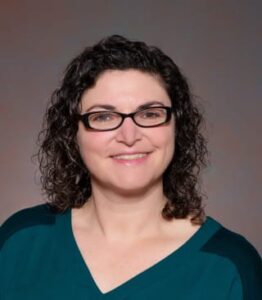Rockwood physician: HIV treatment has evolved. Now, let’s focus on long-term care

When the human immunodeficiency virus (HIV) epidemic first became public knowledge in the early 1980s, very little was known about the virus. Researchers focused their efforts on prevention and treating those already infected.
But four decades later, we’ve reached a point where researchers can now focus on how to care for those living long-term with HIV, says Rachel Safran, MD, an internal medicine provider who specializes in HIV care at MultiCare Rockwood Clinic.
That was thought impossible in the beginning.
“I think we’re at a really exciting and pivotal place. The treatment of most HIV cases has become much simpler,” Dr. Safran explains. “It used to be people took handfuls of pills four times a day and were still sick. Now we have great combinations of one pill a day or long-acting injectables. It’s become more like a chronic disease to manage.”
HIV is spread through contact with the blood, semen or bodily fluids of an infected person, and the virus attacks and destroys infection-fighting cells (CD4 T lymphocyte) in the immune system. This makes it difficult for the body to fight off infections and certain cancers.
One of the most challenging aspects of HIV is that not everyone experiences initial infection symptoms, which can result in continued spread and allow the virus to rapidly multiply in the body. In its most advanced stage or without proper treatment, the virus advances into acquired immunodeficiency syndrome (AIDS).
“Oftentimes when we see people who are infected and not on treatment, it is because they didn’t know they had it,” Dr. Safran says. “For a lot of people when they first get infected, it resembles a mild viral illness, so they don’t get tested. Then later they get really sick and develop complications.”
Awareness of the virus — and when, where and how to test — is crucial for the community, she says, including health care providers in the region.
“I’ve seen cases where we suspect someone has been sick for years, but screening was never thought of,” Dr. Safran says.
While there is no cure for HIV, there are advanced treatments, including antiretroviral therapy (ART) to help prevent the virus from multiplying and advancing. ART can also help reduce the risk of transmission to others by reducing the infected person’s viral load to an undetectable level.

Dr. Safran is one of the Inland Northwest’s only pre-exposure prophylaxis (PrEP) providers, a proactive medication for individuals with a known risk of exposure to HIV. She and her colleagues are focused on getting the word out that PrEP exists, whether through community outreach or working with the Spokane Regional Health District (SRHD) to contact patients who recently tested positive for other sexually transmitted infections (STIs).
Breaking down the stigma surrounding HIV is just as important in the long-term care plan, she adds. Although incidents are lower in Spokane, the stigma remains high, and many people put off seeking care because of that and other reasons.
For those who do visit a doctor, Dr. Safran worries that cost and medical burnout will make treatment unsustainable.
“Mental health is also a big factor here,” she says. “There is a lot of burnout for people who have this heavily stigmatized virus and have seen lots of their friends and partners pass away.”
But she hopes that seeing HIV-positive people living happy, fulfilling and otherwise healthy lives will help reframe the community’s perspective of the virus.
Dr. Safran joined MultiCare Rockwood Clinic in 2021, taking over the patient panel of Daniel Coulston, MD, after she spent many years working alongside him in HIV research and community outreach. She had also spent 10 years teaching residents and students how to care for HIV patients in the primary care setting.
“There are many medical conditions that face stigmas, but HIV and AIDS really spoke to me because of the medical stigma,” she says. “It has certainly gotten better, and I’ve done a lot of advocacy work for the LGBTQ+ community, but I felt there was a lot of really good work that could be done to also find better treatments and outcomes for people who have been really ostracized.
“It’s not something people get a lot of exposure to, and it’s been wonderful to see people breaking down those barriers,” she adds.
People living with HIV are a thriving community who want to be engaged in their own health and success, Dr. Safran says, and the health care industry is positioned to do just that. She believes it starts with research and understanding patients better.
In her role with Rockwood Clinic, Dr. Safran is working on a number of research projects in partnership with the MultiCare Institute for Research and Innovation. Some are focused on how outcomes improve or change when switching between treatment regimens and long-acting solutions, with the hope of modernizing and simplifying her patients’ care plans.
“We are nowhere near a cure, so if we can get every person’s viral level undetectable, then we can prevent more cases,” she says.
Because an HIV-positive status excludes patients from many other clinical trials, it’s critically important to continue the work she and her colleagues are doing, Dr. Safran adds.
“I think it is so important for patients to see the health care community is invested in them, that we are looking for better treatments and we care about them,” she says. “I hope someday to not need HIV treatment studies. Someday that will be in the back of our mind and we’ll be more focused on areas like cancer prevention strategies for HIV patients.”




